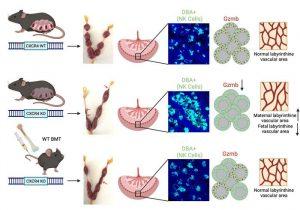Pregnancy is a remarkable journey where the body’s immune system adapts to support the growing fetus while safeguarding the well-being of both the parent and the child. In a recent study, scientists uncovered a key protein that plays a role in the immune system during pregnancy, significantly influencing early placental health during pregnancy (Figure 1).
These immune adjustments primarily unfold within the decidua, the tissue surrounding and connecting with the placenta. Earlier research by the same team illuminated the migration of bone marrow cells, including immune cells, to the uterus and the decidua during early pregnancy. Their curiosity piqued; the researchers delved into the mechanisms underpinning this cell migration.
The spotlight in this research shines on CXCR4 (C-X-C chemokine receptor type 4), a protein crucial for trafficking bone marrow cells in various body tissues. Strikingly, CXCR4 is expressed in higher quantities in the uterus at the onset of pregnancy.
The scientists conducted experiments on mice, eliminating the gene responsible for CXCR4. They observed that mice lacking this protein experienced a higher rate of fetal loss during pregnancy and smaller litter sizes, compared to normal mice. Yet, intriguingly, when CXCR4 was exclusively removed from the uterus, pregnancy remained unaffected. This suggested that CXCR4 expression from outside the uterus played a pivotal role in sustaining pregnancy.
In early pregnancy, natural killer cells within the decidua are instrumental in orchestrating the extensive tissue and blood vessel remodelling required for healthy placental development. Mice without CXCR4 had fewer natural killer cells migrating to the uterus, and these cells exhibited abnormal clustering and reduced levels of a specific enzyme (granzyme B), triggering an unusual inflammatory response. These alterations led to irregular blood vessel arrangements in the placenta and decidua, potentially impacting nutrient exchange between parent and fetus.
The researchers further demonstrated that transplanting healthy bone marrow from regular mice into CXCR4-deficient mice reversed many of these effects. These findings open doors to the prospect of using cell therapy to address such pregnancy-related conditions in the future.
This research uncovers the vital role of CXCR4 in sustaining a healthy pregnancy by regulating immune cell functions, shedding light on potential therapies for pregnancy complications.
Journal article: Lyu, F., et al., 2023. Maternal CXCR4 deletion results in placental defects and pregnancy loss mediated by immune dysregulation. JCI Insight.
Summary by Stefan Botha











